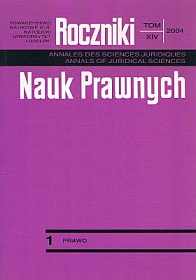Philosophical Foundations of Korean Law
Abstract
The aim of this monograph is to present the philosophical foundations of Korean law, in another words – it is the answer to the question: On which philosophy the Korean law is based? The problem here is not so much the concept of law itself as the concept of philosophy. In the history of Korean thought it is hard to distinguish philosophy from religion. Philosophy, religion and culture build together “the philosophy of life”. In the Korean context it will be Shamanism, Confucianism, Buddhism, Taoism, Christianity and New Religions.
References
Bae C.-H.: Hanguk Yuhaksa (History of Korean Confucianism), Seoul 1983.
Bary W. T., Kim Haboush J.-H. (red.), The Rise of Neoconfucianism in Korea, New York 1985.
Basker E.: Unification Church, [w:] ER t. 15, s. 141-143.
Buswell R. E.: Buddhism in Korea, [w:] ER t.2, s. 421-426.
Buswell R. E.: The Korean Approach to Zen. The Collected Works of Chinul, Honolulu 1983.
Ching J., ChanA.: Laozi, [w:] LR s. 218.
Ching J.: Der religiöse Sinn der Chinesen, „Concilium”, 15(1979), s. 358-361.
Ching J.: What Is Confucian Spirituality?, [w:] J. Eber (red.), Confucianism. The Dynamics of Tradition, New York 1986, s.78-101.
Cho H.-Y.: Koreanischer Schamanismus, Hamburg 1982.
Choi A.: History of Catholic Church in Korea, Seoul 1982.
Chon P.-K.: The Canonical Textbook of Won Buddhism, Seoul 1971.
Chun S.-Y. (red.), Buddhist Culture in Korea (Korean Culture Series, t. 3), Seoul 1974.
Deuchler M.: The Confucian Transformation of Korea. A Study of Society and Ideology, Harvard University Press 1992.
Du (Tu)W. M.: Die neokonfuzianische Ontologie, [w:] W. Schluchter (red.), Max Webers Studie über Konfuzianismus und Taoismus. Interpretation und Kritik, Frankfurt a. M. 1983, s.281.
Daxue (Wielka nauka), XI, [w:] J. Legge, op. cit., t. 1, s. 267.
Eliade M., Shamanismus, [w:] ER t. 13, s. 201-208.
Eliade M., Historia wierzeń i idei religijnych, t. 1-3, Warszawa 1988-1995.
Eliade M., Szamanizm i archaiczne techniki ekstazy, Warszawa 1994.
Farzeen B.: Taoism. An Overview, [w:] ER, t. 14, s.288-306, ze szczególnym uwzględnieniem bibliografii.
Fehl N. E.: Li. Rites and Propriety in Literature and Life. A Perspective for a Cultural History of Ancient China, Hong Kong 1971.
Graf O.: Die Anfänge des Christentums in Korea, [w:] F. Renner (red.), Der fünfarmige Leuchter, St. Ottilien 1971, s. 369-386.
Graf O.: Ein Abriß der Religionsgeschichte Koreas, [w:] Die Großreligionen des Fernen Ostens. China, Korea, Japan, Augsburg 1964, s. 67-87.
Grayson J. H.: Korea. A Religious History, Oxford 1989.
Hardacre H.: Ancestor Worship, [w:] ER t. 1, s. 263-268.
Hsu L.-S.: The Political Philosophy of Confucianism, London 1975.
Huh M.-S.: Koryo Pulgyosa (History of Buddhism in Koryo Dynasty), Seoul 1986.
Janelli R. L., YimJanelliD.: Ancestor Worship and Korean Society, Stanford 1982.
Kendall L., Dix M. G., Religion and Ritual in Korean Society, Berkeley 1987.
Kendall L., Shamans, Houswives and Other Restless Spirits, Honolulu 1985.
Keum C.-T.: The Confucian Religion Movement in the Modern History of Korean Confucianism, „Korea Journal”, 5(1989), s. 4-12.
Keum C.-T.: Yugyo Sasangkwa Chongkyo Munhwa (Confucian Thought and Religious Culture), Seoul 1994.
Keum C.-T.: Yuhak Keunpaeknyon (Hundred Years of Modern Korean Confucianism), Seoul 1984.
Kim J. C.-M. (red.), Catholic Korea. Yesterday and Today, Seoul 1988.
Kim A. J.-S.: Katechese und Inkulturation, Frankfurt a. M. 1987.
Kim Haboush J.-H.: Confucianism in Korea, [w:] ER t. 4, s. 10-15.
Kim K.: Religie koreańskie, [w:] LR, s. 408-409.
Kim Y.-C.: Chondogyo, [w:] ER t. 3, s. 336-337.
Kość A.: Prawo a etyka konfucjańska w historii myśli prawnej Chin, Lublin 1998.
Korean Overseas Culture and Information Service (wyd.), A Handbook of Korea, wyd. 10, Seoul 1998, s. 424-441.
Korean Overseas Information Service (wyd.), Facts about Korea, Seoul 1993, s. 131-138.
Laotzu: The Way and Its Power, tłum. A. Waley, London 1934.
LeeJ.-Y.: Ancestor Worship and Christianity in Korea, Lewiston–Queenston 1988.
Laotse, Tao te king (Laozi, Daodejing), Düsseldorf–Köln 1976.
Malek R.: Das Chai-chieh lu. Materialien zur Liturgie im Taoismus, Frankfurt a. M.–Bern–New York 1985, s.96-107.
Malek R.: Das Ethos des Konfuzianismus und Daoismus, [w:] A. T. Khoury (red.), Das Ethos der Weltreligionen, Freiburg im. Br. 1993, s.75-117.
Mo Ti (Mo Di): Von der Liebe des Himmels zu den Menschen. Aus dem Chinesischen übersetzt und herausgegeben von Helwig Schmidt-Glintzer, München 1992, s.67-70.
Mong Dsi (Mong Ko, Mengzi), tłum. R. Wilhelm, Jena 1921, s.57.
Nivison D. S.: Li, [w:] ER t. 8, s. 535-536.
Nivison D. S.: Tao and Te, [w:] ER t. 14, s.283-286, ze szczególnym uwzględnieniem bibliografii.
Ogarek-Czoj H.: Mitologia Korei, Warszawa 1988.
Ogarek-Czoj H.: Religie Korei. Rys historyczny, Warszawa 1994.
Park C.-H.: Historical Review of Korean Confucianism, „Korea Journal”, 3(1963), s. 5-11.
Quack A.: Szamanizm, [w:] LR, s. 448-449.
Roetz H.: Mensch und Natur im alten China. Zum Subjekt–Objekt-Gegensatz in der klassischen chinesischen Philosophie. Zugleich eine Kritik des Klischees vom chinesischen Universismus, Frankfurt a. M.–Bern–New York 1984.
Schipper K. M.: Le corps taoïste, corps physique, corps social, Paris 1982.
Taylor R. L.: The Way of Heaven. An Introduction to the Confucian Religious Life, Leiden 1986.
Thompson L. G.: Tien, [w:] ER t. 14, s.508-510.
The Korean Overseas Culture and Information Service (wyd.), A Handbook of Korea, wyd. 10, Seoul 1998, s. 437-438.
Vos F.: Die Religionen Koreas, Stuttgart 1997.
Yim S.-J., JanelliR. L., Yim JanelliD.: Korean Religion, [w:] ER t. 8, s. 368.
Yoon S.-S.: Hanguk Yuhak Sasangron (Studies on Korean Confucian Thought), Seoul 1986.
Yoon S.-S.: Hanguk Yuhak Yongu (Studies on Korean Confucianism), Seoul 1980.
Copyright (c) 2004 Roczniki Nauk Prawnych

This work is licensed under a Creative Commons Attribution-NonCommercial-NoDerivatives 4.0 International License.


